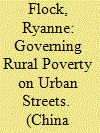| Srl | Item |
| 1 |
ID:
091011


|
|
|
|
|
| Publication |
2009.
|
| Summary/Abstract |
This study examines the changes in public discourse and state policy towards beggars and vagrants during the reign of Abd lhamid II (1876-1908) and the early years of the Second Constitutional Period (1908-1914). During the Hamidian period, although the educated public's concern and anxiety towards the idle poor increased, government action towards the urban poor remained limited. The constitutional regime of the post-1908 period provided the police with new legislative tools to control beggars and vagrants and the government launched a campaign against the urban idle poor. Despite these steps, however, the government fell short in its attempt at regulating the idle poor.
|
|
|
|
|
|
|
|
|
|
|
|
|
|
|
|
| 2 |
ID:
192182


|
|
|
|
|
| Summary/Abstract |
This study investigates how discourses on panhandling intertwine with the governance of beggars on China's urban streets. It focuses on local policy implementation in Guangzhou city, led by the bureau of civil affairs along with its centres for “custody and repatriation” and “assistance stations.” The study aims to understand how the state regulates panhandling and engages with beggars in public spaces. Exploring the internal logic of the state's approach and how it has changed during the 40 years of reform, it also considers the junctures at which contradictions and conflicts arise. Based on fieldwork data (2011 to 2014) and the analysis of government documents, yearbooks, academic and mass media discourses, I argue that the state's treatment of panhandlers poses a conundrum as welfare measures conflict with control. While several layers of state regulation and actors contradict each other and create grey areas of state-induced informality, people who beg for alms are continuously criminalized and excluded from public space.
|
|
|
|
|
|
|
|
|
|
|
|
|
|
|
|